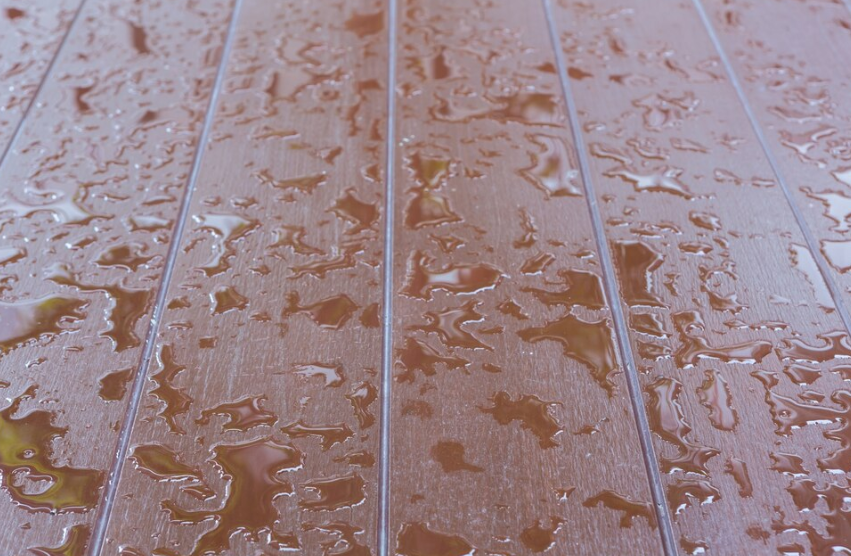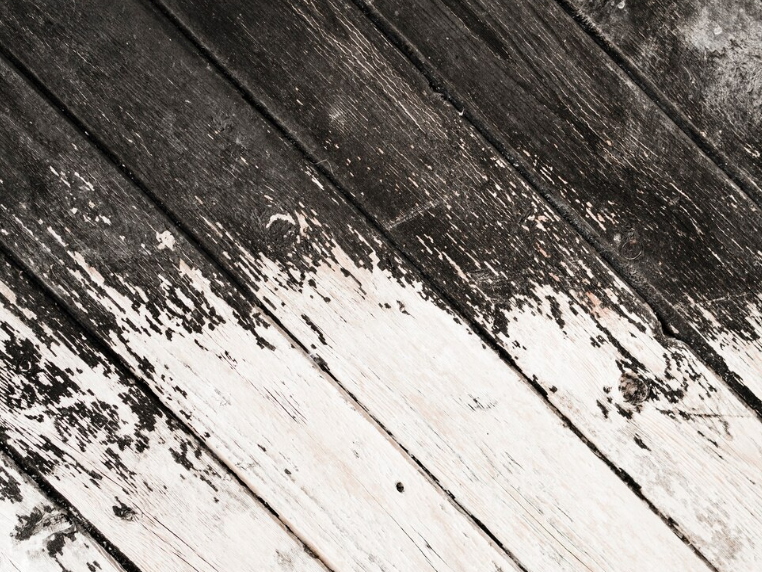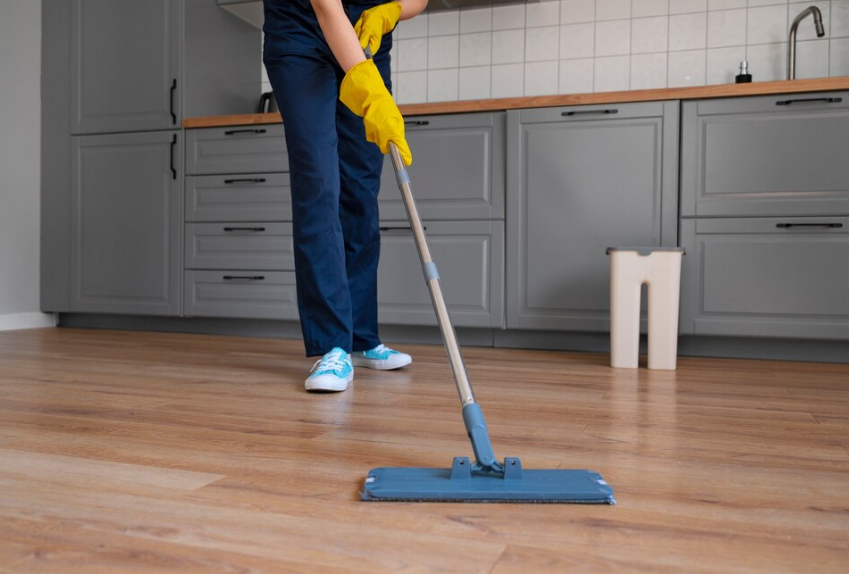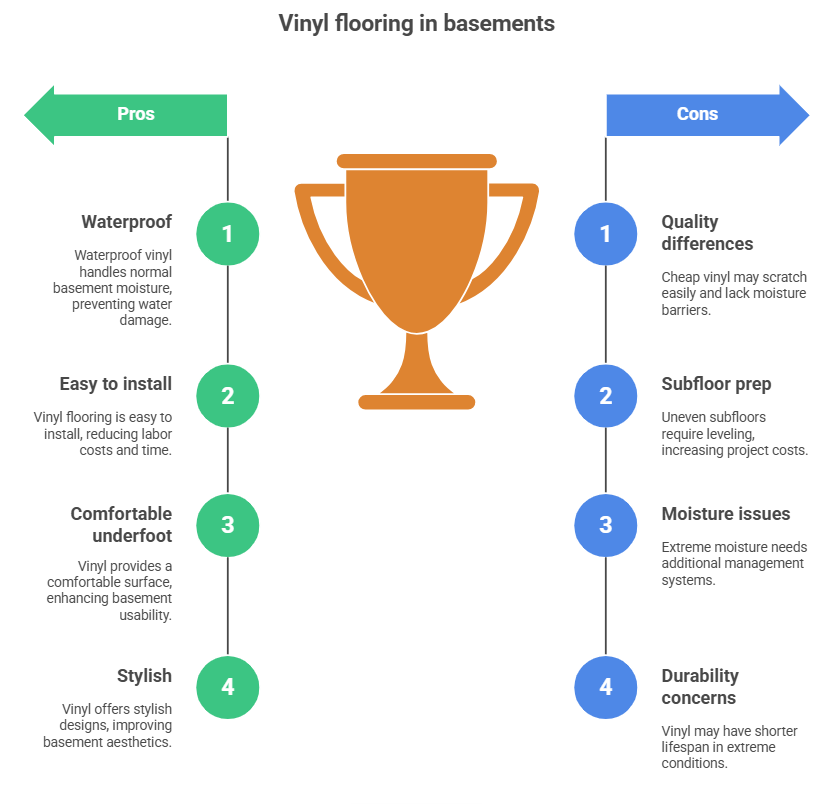Yes, vinyl flooring is an excellent choice for basements, particularly waterproof luxury vinyl tile (LVT) and luxury vinyl plank (LVP), due to its superior moisture resistance, durability, and comfort underfoot.
Basements are the ultimate flooring challenge. Unlike upper floors, these below-grade spaces battle constant humidity (often 60-80%), dramatic temperature swings, and lurking moisture threats from foundation seepage, pipe condensation, and seasonal groundwater fluctuations. Traditional materials fail spectacularly here – hardwood warps within months, carpet breeds mold and mildew, and even ceramic tiles can crack from freeze-thaw cycles.
Let’s dive into the pros and cons of vinyl flooring in basements to help you make an informed decision for your space.
Key Considerations for Basement Flooring, and Why Vinyl Flooring Could Be a Top Choice for Basements
Moisture/Water Resistance: The Primary Concern

Moisture resistance is the most critical factor for basement flooring. Basements experience higher humidity and water vapor penetration through concrete floors and walls. Traditional materials like hardwood warp and develop mold when exposed to moisture, while carpet becomes a breeding ground for mildew.
Waterproof vinyl flooring for basements features a completely waterproof core that won’t absorb moisture, even when submerged. This prevents water from seeping through to the subfloor, protecting your investment and maintaining healthy indoor air quality.
Durability for High-Traffic Areas

Basements serve multiple purposes: entertainment spaces, home offices, storage areas, and workshops. Your basement floor must withstand varying foot traffic and potential impacts from furniture movement or equipment storage.
Luxury vinyl flooring for basement applications offers exceptional durability through multi-layer construction. The wear layer protects against scratches and scuffs, while the rigid core provides stability and impact resistance. Unlike ceramic tiles that crack under heavy loads, vinyl flooring maintains integrity under substantial weight.
Comfort and Insulation Properties

Basement environments are typically 10-15 degrees cooler than upper floors. Concrete subfloors feel uncomfortably cold, especially during winter. Vinyl flooring provides better thermal insulation than ceramic tile or polished concrete, creating a more comfortable walking surface.
The slight cushioning effect of vinyl flooring adds comfort for extended standing or playing, making it ideal for basement playrooms, exercise areas, or workshop spaces.
Ease of Cleaning and Maintenance

Basements accumulate more dust, dirt, and occasional spills. The smooth, non-porous surface of vinyl flooring allows easy cleaning with regular sweeping and mopping. Unlike carpet that traps allergens and odors, vinyl flooring can be thoroughly cleaned and sanitized.
Seamless installation eliminates grout lines where dirt and moisture accumulate, further simplifying maintenance.
Cost-Effectiveness for Basement Renovations
Budget considerations often drive basement renovations. Vinyl flooring offers an attractive price point compared to ceramic tile or engineered hardwood while delivering professional results.
Installation costs are typically lower than tile work, and many vinyl products are designed for DIY installation, potentially saving thousands in labor costs. Faster installation also reduces overall project costs.
Potential Limitations of Vinyl Flooring in Basements
While vinyl flooring offers significant advantages for basement applications, it’s important to understand its limitations before making your decision.

Quality Differences Matter
Not all vinyl flooring products perform equally in basement applications. Cheap vinyl flooring for basement use may feature thin wear layers that scratch easily, low-quality printing that fades, or inadequate moisture barriers that fail under basement conditions.
Lower-grade vinyl products may lack dimensional stability needed for temperature fluctuations. Investing in quality luxury vinyl tile or plank flooring ensures better performance and longevity.
Read More: LVT vs LVP: The Ultimate Comparison (with Chart)
Subfloor Preparation Requirements
Basement concrete slabs often have unevenness, cracks, or surface imperfections that telegraph through vinyl flooring. Unlike ceramic tiles that accommodate minor subfloor irregularities, vinyl flooring requires a smooth, level surface for optimal performance.
This may require additional preparation work, such as concrete leveling compounds or moisture barriers, adding to project costs. Proper subfloor preparation is essential for warranty coverage and long-term performance.
Extreme Moisture Situations
While waterproof vinyl flooring handles normal basement moisture conditions, basements with serious water infiltration issues may require additional moisture management systems. Even the best vinyl flooring won’t solve underlying foundation problems or replace proper drainage and waterproofing measures.
Basements prone to flooding or significant water intrusion need additional moisture barriers or drainage systems before flooring installation.
Long-term Durability Considerations
Vinyl flooring offers excellent durability for most basement applications but may have a slightly shorter lifespan compared to ceramic tile or sealed concrete in extreme conditions. Heavy commercial use or chemical exposure might affect the wear layer over time.
For typical residential basement use, quality vinyl flooring provides 15-20 years of reliable service when properly installed and maintained.
For detailed information about LVT flooring: What is LVT Flooring? Pros & Cons
Vinyl vs. Laminate: The Basement Showdown
Given vinyl’s strengths and limitations, how does it compare to laminate flooring, another popular basement consideration? Is laminate or vinyl flooring better for basement use?
Vinyl flooring wins decisively. Traditional laminate flooring features a fiberboard core that swells and deteriorates when exposed to moisture, making it unsuitable for basement installation. Even moisture-resistant laminate products don’t match the complete waterproof protection of luxury vinyl flooring.
Vinyl flooring’s waterproof core won’t swell, warp, or delaminate in high-humidity basement conditions. The dimensional stability of vinyl flooring handles temperature fluctuations better than laminate, preventing gaps or buckling from seasonal changes.
Both materials fall into similar price ranges, but vinyl flooring’s superior moisture resistance and durability make it the more practical long-term investment for basement installations.
Conclusion: Why Vinyl Flooring Excels in Basement Environments
After examining vinyl flooring’s performance across all key basement requirements and comparing it to alternatives, the evidence strongly supports vinyl as the optimal choice. Its combination of complete moisture resistance, durability, comfort, and cost-effectiveness addresses the unique challenges of below-grade environments.
Success requires selecting quality products designed for demanding applications and ensuring proper installation over well-prepared subfloors. While cheaper alternatives may seem attractive initially, investing in premium vinyl flooring products delivers better performance and longevity in basement conditions.
Waterproof vinyl flooring provides the perfect balance of practicality and aesthetics, transforming cold concrete floors into comfortable, attractive living spaces that withstand basement challenges for years.
When planning your basement flooring project, consider partnering with experienced manufacturers who understand basement installation requirements. Quality LVT production capabilities, such as those offered by Boyu’s LVT production line, ensure you receive products engineered to excel in demanding basement environments.
Choose vinyl flooring for your basement and enjoy a beautiful, durable, worry-free floor that enhances your home’s livable space while protecting your investment.
